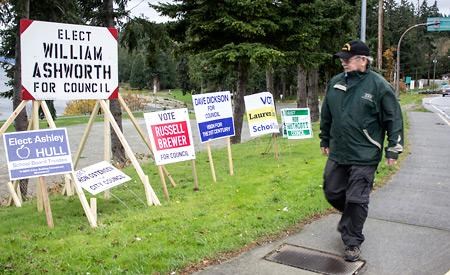Campaign races for local governments and school boards are tightening across the province as voters spend the last week figuring out which candidates best represent their views.
Here, voters will decide who will sit on City of Powell River council, Powell River Regional District board and Powell River Board of Education. This local layer of elected officials often has the largest impact on the lives and well-being of residents. These are the people who are responsible for the roads, sewers, garbage and recycling collection, parks and classrooms.
In 2011, the last civic elections, only about four out of 10 eligible city and regional district voters participated. Local election turnouts tend to be lower compared to provincial or federal ones which usually have about 60 per cent participation in BC.
The Peak spoke with Christine Beresford about voter participation and what influences people to cast a ballot on election day. Beresford is executive director of the Columbia Institute’s Centre for Civic Governance, a Vancouver-based progressive policy think-tank.
“It’s really a combination of factors at the municipal level,” said Beresford. “One of the big reasons that people give is they often feel like they don’t have enough information.”
Often eligible voters say that they do not feel like they know who the candidates are or know the issues very well, Beresford said.
She added that in addition to local media outlets, social networks play an important role in providing information about issues and candidates and determining whether or not people vote.
“People have conversations at the coffee shop, that’s often how they get their information,” she said. “If people are not plugged into social networks that are following local politics then they may not be getting the same kind of social cues to go and vote.”
Another factor why people may not vote is that they don’t feel that their vote is going to make a difference, Beresford said.
“Now we all know that isn’t true,” she said. “There are lots of stories of people who have won or lost by five votes.”
For example, in Powell River in 2011, the difference between being elected to city council or not, was 121 votes. Myrna Leishman, the last councillor elected, received 2,139 votes and Scott Lukianchuk garnered 2,018.
Beresford added that sometimes people who voted feel if their candidate did not win and the outcome was not what they wanted it was a waste of time. “But that’s a bit self-defeating,” she said. “If you don’t shoot you’ll miss for sure.”
She explained that Canadian democracy works best when it represents all of society.
“Young people are the demographic that votes the least,” she said. “It’s a shame because it’s really important for the democratic outcome to have participation from everyone. It’s also important because young people tend to have a different set of priorities than people further along.”
There is room for a more engaging discussion around citizenship and voting, she said.
One of the things Beresford would like to see is more education for young people on voter literacy, something that would encourage the habit of voting.
“Voting may be a small part of citizenship, but it is a powerful indicator of a person’s willingness to engage with one’s community and be a part of the democratic process,” she said. “Think through what kind of government you want and what issues are important for you.”
Peak Publishing is hosting an all-candidates meeting for school board trustees at 7 pm Thursday, November 6, at Max Cameron Theatre, Brooks Secondary School.
More information about all candidates running for local election can be found online Your Vote Matters and in a special six-page section of the Weekend Shopper, published Friday, November 7.



